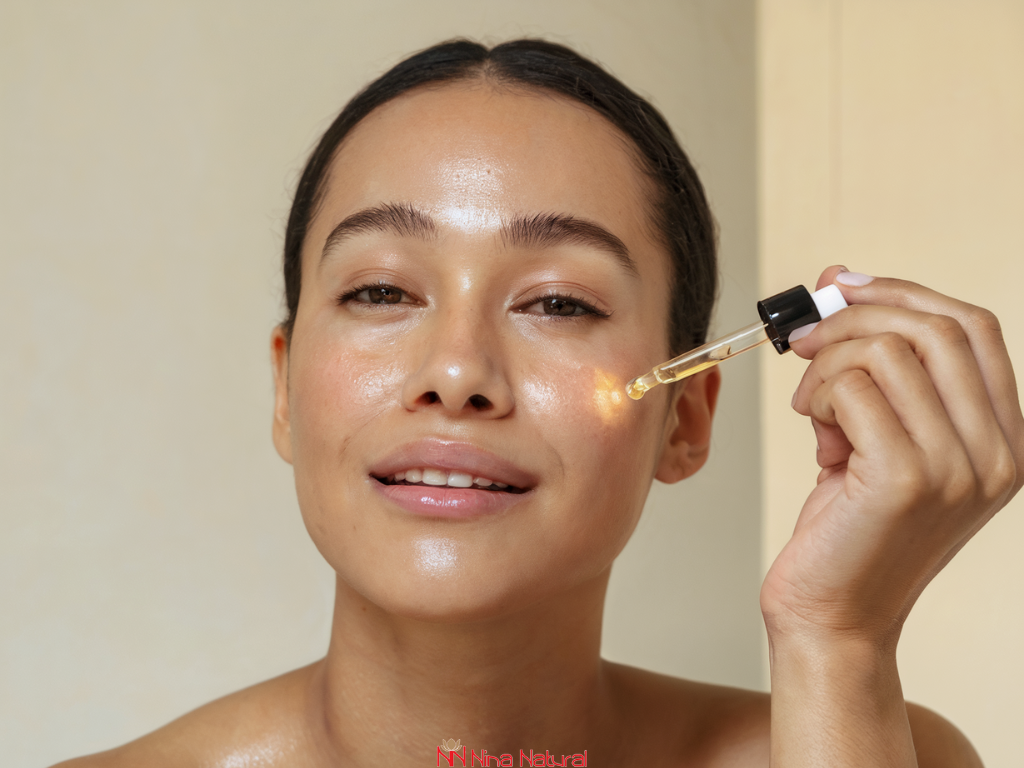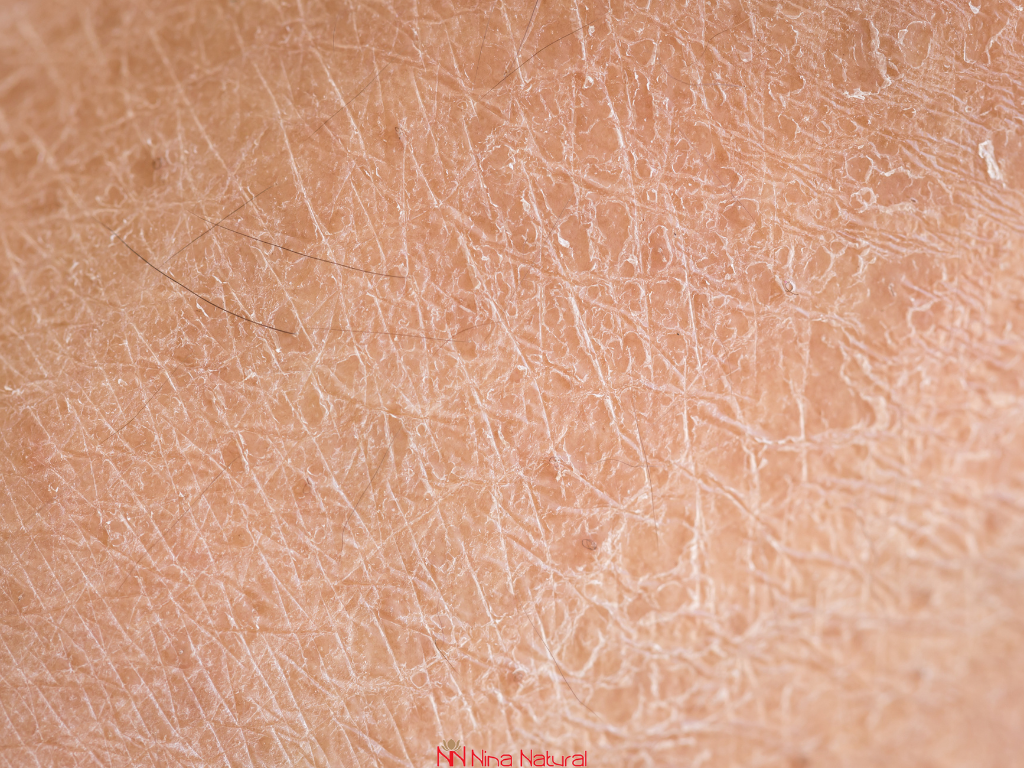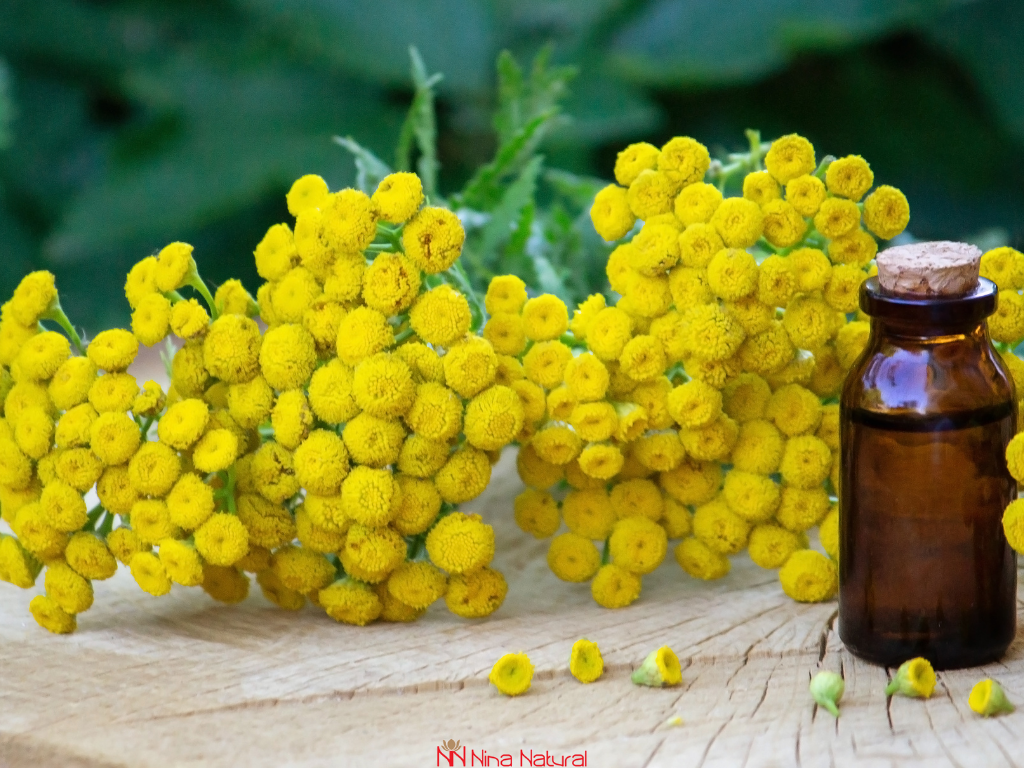Natural oils as antioxidants for facial skin care

Natural oils in facial skincare products are more than just an addition to your hydration routine. They’re your skin’s natural ally in the daily battle against external stressors. Our skin faces constant exposure to sun, wind, pollution, and stress, yet it has an incredible ability to defend and renew itself. Natural oils are there to give it extra strength, helping your skin stay hydrated, elastic, and radiant despite everyday challenges.
The antioxidants in natural oils act like an invisible shield, helping skin maintain its elasticity, tone, and glow. Beyond protection, natural oils support the skin’s natural barrier, locking in moisture and strengthening its resistance to external aggressors.
What are antioxidants and oxidative stress?
Antioxidants are created when plants convert nutrients they absorb from soil, water, and light into protective molecules like vitamins, polyphenols, and flavonoids. This helps them protect themselves from the sun and other external factors. In the human body, antioxidants are made from food molecules and amino acids through natural metabolic processes, while skin uses these molecules to maintain its barrier and promote regeneration. When we use cold-pressed oils, they deliver these natural antioxidants directly to the skin, whereas refined oils lose most of their protective properties.
Cold-pressed and extra virgin oils retain the most antioxidants because they aren’t exposed to high temperatures or chemical processing. Lightly filtered or infused oils can still contain a good portion of natural protective molecules. In contrast, refined oils lose most of their vitamins and polyphenols and contribute less to skin preservation. By using the right oils, we bring natural antioxidants directly to the skin and help it defend against external aggressors.
Oxidative stress occurs when there are too many free radicals in the body or on the skin, and the defense system, antioxidants can’t neutralize them. It’s like when a shield can no longer protect the skin from external attacks. The result is cell damage, accelerated skin aging, loss of elasticity, dryness, wrinkle formation, and a weakened natural skin barrier.
So, oxidative stress is the skin’s “internal unrest” caused by external and internal factors, while antioxidants from natural oils act as calm, silent guardians that balance this equilibrium.

How do natural oils help neutralize free radicals?
Natural oils provide powerful support in the fight against free radicals, molecules that accelerate aging and diminish the skin’s radiance. They’re true treasure troves of powerful antioxidants: rich in vitamins, polyphenols, sterols, and flavonoids, which together protect the skin from external influences and help it stay balanced and vital.
Sterols – guardians of the barrier and moisture
Plant sterols (phytosterols) are lipids structurally similar to cholesterol but of plant origin. Their main role is strengthening the skin’s protective layer. They integrate into the lipid barrier and literally “repair” and fortify it. This way, sterols prevent transepidermal water loss, helping moisture stay “locked” in the tissue. A healthy, strong barrier is the first line of defense against the entry of external aggressors and the onset of inflammation.
Polyphenols – the main antioxidant shield
Polyphenols are key players in the fight against oxidative stress. They act as scavengers and neutralizers of free radicals (Reactive Oxygen Species), donating an electron and rendering them harmless. Polyphenols also reduce oxidative stress caused by UV radiation and pollution. They act as cell guardians by protecting the skin’s structural proteins (collagen and elastin) from breakdown, directly stimulating renewal and long-term tissue firmness.
Flavonoids – fighters against redness and reactivity
Flavonoids, as part of the polyphenol family, have powerful anti-inflammatory effects. They specifically soothe chronic, silent skin inflammation, effectively reducing redness and sensitivity. By stabilizing capillaries and calming the cellular stress response, flavonoids significantly contribute to an even and calm complexion, restoring the skin’s radiant and balanced appearance.
Everyday negative environmental factors
UV radiation
Sunrays, even in low light, generate free radicals that directly attack and break the bonds of collagen and elastin, leading to their degradation. This structural damage results in loss of firmness and elasticity, as well as the inevitable appearance of wrinkles and sagging skin.
Pollution
Pollution particles and toxic oxidative elements penetrate the skin, where they cause lipid oxidation and local inflammation. This inflammation disrupts the skin’s natural barrier function, making it permeable and vulnerable. The consequences are dehydration, increased sensitivity, and stimulation of melanocytes (cells that overproduce and release melanin), which manifests as dark spots, uneven and tired-looking skin.
Stress
Chronic psychological or physical stress leads to elevated cortisol secretion (stress hormone). Cortisol slows the synthesis of new collagen while promoting the breakdown of existing collagen, directly contributing to skin thinning and sagging. Stress-induced barrier disruption makes skin hypersensitive, dry, and prone to worsening inflammatory conditions like eczema or acne.
Poor Diet
A diet rich in sugars triggers glycation, where sugars bind to collagen and elastin fibers, making them rigid and dysfunctional. This results in irreversible loss of elasticity and the formation of deep wrinkles. Simultaneously, lack of dietary antioxidants leaves skin without internal defense, making it susceptible to external oxidative attacks.
Understanding that all these factors are sources of free radicals emphasizes the need for effective protection. This is where natural oils, rich in antioxidants, come into play: they act as neutralizers of harmful molecules and actively strengthen the skin’s natural lipid barrier.

The most popular natural oils with antioxidant properties
Natural oils hold a special place in skincare thanks to their diverse properties. Each oil has a unique composition and mode of action, meaning they can contribute to different aspects of maintaining skin health. Some stand out particularly for their ability to help maintain elasticity, tone, and overall skin vitality.
Below we’ll introduce you to the most effective oils with antioxidant properties, looking at their basic characteristics and their value in skincare.
Argan oil
Argan oil is a natural oil rich in vitamin E, fatty acids, polyphenols, and carotenoids, which together help skin maintain its protective barrier, hydration, and elasticity. Vitamin E acts as an antioxidant and neutralizes free radicals, fatty acids support the skin’s natural barrier, while polyphenols and carotenoids contribute to reducing inflammation and preserving a youthful appearance. Regular application helps skin stay smooth, soft, and more resistant to daily influences.
How to choose the oil: Select cold-pressed, unrefined argan oil, packaged in a dark glass bottle. You can recognize good quality by its mild nutty scent and golden-brown color. Avoid oils with additives, perfumes, or mineral oils.
Almond oil
Almond oil is rich in monounsaturated fatty acids, vitamin E, phytosterols, and polyphenols, making it a powerful antioxidant for skin. Vitamin E helps reduce oxidative stress and protect skin cells, fatty acids strengthen the natural barrier and retain moisture, while phytosterols and polyphenols soothe skin, reduce redness, and contribute to preserving a youthful appearance. Due to these properties, almond oil is especially suitable for dry, sensitive, and mature skin, helping it maintain tone and natural glow.
How to choose the oil: Cold-pressed, unrefined almond oil, preferably packaged in a dark glass bottle. You can recognize good quality by its mild sweet almond scent and golden color.
Coconut oil
Coconut oil is known for its ability to intensely hydrate and nourish skin, thanks to its content of saturated fatty acids, primarily lauric acid, as well as vitamin E and phenolic compounds that act as antioxidants. These ingredients help strengthen the skin’s protective layer and neutralize free radicals, reducing oxidative stress and potential inflammation. While it provides deep hydration, coconut oil is quite comedogenic (prone to clogging pores) and is therefore not recommended for oily and acne-prone skin.
How to choose the oil: Select unrefined, cold-pressed coconut oil in a dark bottle, with a mild coconut scent and natural white or light yellow color. Unrefined means it hasn’t undergone chemical processing, bleaching, or deodorization. Cold-pressing ensures high temperatures aren’t used, preserving medium-chain fatty acids and antioxidants.
Sesame oil
Sesame oil is valued for its rich content of linoleic and oleic acids, which help preserve the skin’s natural barrier and hydration. Its antioxidant properties come primarily from sesamol and sesamin, natural phenolic compounds that neutralize free radicals and protect skin from oxidative stress. Additionally, sesame oil has a mild soothing effect, reduces redness and irritation, and contributes to maintaining skin firmness and tone. Regular application can help preserve a youthful appearance and protect against premature aging.
How to choose the oil: Best to use cold-pressed, unrefined sesame oil in a dark glass bottle. You’ll recognize good quality by its mild, characteristic raw seed scent and rich, yellow color. Avoid products with added fragrances or additives, as such oils lose a significant portion of their nutritional and protective ingredients.
Avocado oil
Avocado oil is rich in oleic acid, which penetrates deep into the skin and helps restore the barrier. Its antioxidant properties come from vitamin E, carotenoids, and phytosterols, which together reduce oxidative stress. Avocado oil supports skin regeneration, relieves dryness and contributes to maintaining elasticity, soothes irritation and redness.
How to choose the oil: Ideal is cold-pressed, unrefined avocado oil in a dark glass bottle, without additives and perfumes. Quality oil has a slightly greenish color and mild, natural scent. Avoid refined oils and products with additives, as they lose a significant portion of their nutritional and protective properties.
Rosehip oil
Rosehip oil is valued for its high content of essential fatty acids, primarily linoleic and linolenic acids, as well as vitamins A and C, which act as powerful antioxidants. Its primary function, confirmed by research, is skin renewal and regeneration, reducing visible signs of aging such as fine wrinkles and hyperpigmentation.
How to choose the oil: For proper care, look for cold-pressed, unrefined rosehip oil in a dark glass bottle, 100% pure, without added fragrances or additives. Quality oil is recognized by its light orange color and mild scent, while refined oils that lose a significant portion of their nutritional and protective ingredients should be avoided.
Jojoba oil
Jojoba oil is technically a liquid wax and provides special stability to skin. It contains vitamin E, phytosterols, and monounsaturated fatty acids. Its structure is similar to the skin’s natural sebum, so it’s easily absorbed and helps restore the barrier without clogging pores. Antioxidants contribute to reducing oxidative stress, and it’s especially suitable for balancing and soothing skin prone to irritation.
How to choose the oil: For optimal care, look for cold-pressed, unrefined jojoba oil, preferably in a dark glass bottle. Quality oil has a light yellow color and mild, neutral scent. Avoid refined oils and products with additives or perfumes, as they lose nutritional and protective properties.
Macadamia oil
Macadamia oil is rich in palmitoleic acid, a rare fatty acid that naturally exists in skin and helps restore the barrier. It contains vitamin E and phytosterols that act as antioxidants, protecting skin cells from free radicals and oxidative stress. Its light texture allows for quick absorption while nourishing and softening skin. It’s suitable for mature and dry skin, supports regeneration and preservation of elasticity and natural glow.
How to choose the oil: Cold-pressed, unrefined macadamia oil, light yellow to golden in color with a mild nutty scent. Choose oil in a dark glass bottle to preserve nutritional ingredients. Avoid refined oils and products with added fragrances or additives.
Evening primrose oil
Evening primrose oil is rich in gamma-linolenic acid (GLA). It also contains phytosterols and tocopherols, which act as antioxidants and help reduce oxidative stress. This oil is especially suitable for sensitive, dry, or irritated skin, strengthens the natural barrier, hydrates, and helps maintain elasticity. Regular application can contribute to calming redness, reducing inflammation, and preserving a youthful skin appearance.
How to choose the oil: Cold-pressed (unrefined) – obtained without heating and chemicals, retains maximum content of polyphenols, vitamin E, and antioxidants. This is the best choice for skincare as it provides the greatest protection and supports regeneration.
Immortelle oil
Immortelle oil has powerful antioxidant properties thanks to its rich content of flavonoids and sesquiterpenes. These compounds help with skin renewal and tone. Immortelle oil is also valued for its ability to soothe and regenerate skin, especially sensitive or damaged areas. Regular use can contribute to smoothing fine lines, evening skin tone, and preserving natural skin radiance.
How to choose the oil: Ideal is to choose 100% natural immortelle essential oil in a dark glass bottle, without additives and perfumes. Quality oil has a rich, characteristic scent and light yellow to orange-golden color. Avoid products containing synthetic additives, as they can reduce the effectiveness and nutritional properties of the oil.

Essential oils and their use in skincare
Essential oils are highly concentrated and should not be applied directly to skin. The safest approach is to dilute them in plant oil, such as jojoba, argan, almond, or grapeseed oil. For the face, optimal dilution is 1-5%, and for the body it can be up to 10%, depending on skin sensitivity. Before first use, a patch test on a small area of skin is recommended, such as the inner forearm, to check for any reaction.
Carrot
Effect on skin: Carrot oil is rich in carotenoids and vitamin A, helps neutralize free radicals, supports cell regeneration, and soothes tired or uneven complexion. Regular use contributes to gradual evening of pigmentation and preservation of natural skin glow.
How to dilute: For face, add 1-2 drops of carrot oil to 5-10 drops of carrier oil like jojoba, argan, or almond. For the body, you can use up to 10% dilution relative to the carrier oil. Before application, test on the inner forearm.
Frankincense
Effect on skin: Frankincense essential oil contains sesquiterpenes and monoterpenes, which help protect cells from oxidative stress. They reduce redness and skin sensitivity, and support collagen production. Especially suitable for mature skin as it maintains elasticity and resistance to external factors.
How to dilute: 1-2 drops of frankincense oil in 5-10 drops of carrier oil for face, and for body up to 10% dilution. Before application, mandatory test on a small area of skin.
Geranium
Effect on skin: Geranium oil is rich in flavonoids and tannins, acts as an antioxidant, shows certain in vitro SPF (protection from sun’s UV radiation), maintains hydration. Suitable for tired and stressed skin, improves complexion appearance and gives a healthier glow.
How to dilute: For face 1-2 drops of geranium oil in 5-10 drops of carrier oil, and for body up to 10% dilution. Test on a small area of skin before first use.
Most effective oils for your skin type
Dry and mature skin
Best are nourishing oils that restore the skin barrier. Argan oil nourishes and improves elasticity, avocado soothes irritation, and almond makes skin soft and smooth. Macadamia regenerates and strengthens skin protection, while its light texture facilitates absorption. Regular use improves skin tone, reduces fine lines, and gives a youthful appearance.
Oily and combination skin
Light oils that balance sebum work best for this skin type. Jojoba regulates oiliness and maintains hydration, grapeseed oil provides antioxidant protection without a greasy residue, while apricot oil soothes and evens out the complexion. The combination of these oils makes skin smooth and more resistant to external stressors.
There’s a myth that natural oils shouldn’t be used on oily skin, but natural oils aren’t the enemy of oily skin. The misconception that oils necessarily worsen oily skin mainly stems from overgeneralization. The truth is that some oils (like mineral oils or very heavy plant oils) can clog pores, while others can actually improve skin condition.
Sensitive skin
Needs oils that soothe, protect, and restore the skin barrier. Evening primrose oil reduces inflammation and irritation, while immortelle oil soothes redness, regenerates cells, and neutralizes free radicals. Regular application makes skin softer, even-toned, and vital.
Problematic skin
Best are oils with regenerative and anti-inflammatory effects. Rosehip oil renews skin and reduces scars, sesame oil protects and soothes, and geranium oil strengthens the barrier and evens complexion. Regular use supports skin’s natural resistance and reduces irregularities.
How to use natural oils for healthy and nourished facial skin
Proper amount and application
With natural oils, less is truly more. Just a few drops are enough. Too much oil can overload the skin and diminish the hydration effect. Oil should always be applied to slightly damp skin, as it penetrates deeper layers more easily and doesn’t leave a greasy trace on the surface. When properly dosed, oil doesn’t clog pores but helps maintain skin’s natural balance and prevents moisture loss. With gentle finger movements, massage it in until fully absorbed, especially on areas prone to dryness or tightness.
Combination with serums, creams, and active ingredients
Natural oils can be an excellent addition to existing skincare routines, but it’s important to know how to combine them properly. The key is to choose unrefined, cold-pressed oils (such as argan, jojoba, or grapeseed) because they’re richer in essential fatty acids and vitamins, and work well with most active substances.
Oils are applied in two key ways:
- As a final layer: Applied after serum and cream to “lock in” active ingredients and moisture in the skin. This occlusive layer ensures deep hydration and increases elasticity.
- Direct mixing: Can be mixed with a small amount of cream for a richer emollient effect and additional elasticity, enriching the cream’s texture.
With strong active ingredients (like retinol or acids) you need to be careful. If skin is sensitive, it’s best to use oils at different times of day, for example: active ingredients in the evening, and oils in the morning. If used together, oil is always applied last, to buffer the penetration of active substances and reduce potential irritation. This combination provides skin with a balance between protection, regeneration, and deep hydration, without overload.
Tips for storing and using natural oils
Oil quality directly depends on how they’re obtained and stored. Cold-pressed oils retain their natural composition, vitamins, and antioxidants, making them significantly more effective in skincare. It’s important to avoid heating them above 60-70°C, as high temperature breaks down active components and reduces antioxidant properties. Oils should be stored in dark glass bottles, away from light and heat, preferably at room temperature. This extends their shelf life while preserving their purity, scent, and effectiveness on skin.
Benefits of combining oils
Natural oils complement each other best when combined. Each oil has its unique nutritional ingredients; when we combine them, their effects are amplified.
- Argan + Avocado oil – intensely renews and nourishes skin, reduces dryness and provides softness.
- Almond + Macadamia oil – makes skin more elastic, gentle and radiant, ideal for areas with fine lines.
- Jojoba + Grapeseed oil – light combination that balances oiliness, absorbs quickly and doesn’t clog pores.
- Apricot oil + Jojoba – soothes skin, hydrates and maintains even tone, without heaviness.
- Evening primrose oil + Immortelle oil – gently soothes irritation and redness, protects skin and supports its regeneration.
- Almond + Immortelle oil – restored skin barrier, gentle hydration and long-lasting protection.
- Rosehip oil + Sesame oil – supports skin regeneration, reduces traces of scars and hyperpigmentation.
- Geranium + Grapeseed oil – evens complexion, strengthens skin and hydrates without additional heaviness.
Usage tips:
- Mix 2-3 oils that suit your skin type.
- Apply 3-6 drops to the face, preferably on slightly damp skin.
- Always add essential oils diluted (1-2 drops in carrier oil).
- Start with smaller amounts and monitor how skin reacts.
Seasonal use of plant oils
Skin changes throughout the year, so it’s important to adapt care to the season to keep it hydrated, elastic, and resistant to external influences. Plant oils can be used as a flexible ally in this process, choosing them according to skin needs in different periods of the year.
Spring and summer
During warmer months, skin is often exposed to sun, pollution, and higher temperatures, which is why it benefits from light and fast-absorbing oils that don’t leave a greasy trace and allow skin to breathe. Ideal are grapeseed oil, jojoba oil, or apricot oil, as they help maintain hydration, strengthen the skin barrier, and neutralize free radicals caused by UV radiation. These oils protect skin while making it fresh and even-toned, without a heavy feeling.
Autumn and winter
Colder and drier periods require additional protection. Dry air, heating, and sudden temperature changes can lead to irritation, redness, and loss of skin moisture. During these months, thicker and more nourishing oils like almond, avocado, or immortelle oil are recommended, which restore the lipid barrier, reduce moisture loss, and provide long-lasting hydration. These oils deeply nourish the skin, help restore elasticity, and make it more resistant to external aggressors.

What an ideal daily and nightly routine with natural oils looks like
Morning routine
During the day, skin is exposed to external influences—sun, pollution, and environmental stress. So morning care should provide protection and lightness, without a heavy feeling on the skin. Ideal are light, fast-absorbing oils that don’t leave a greasy trace.
Oils like jojoba, argan oil, and grapeseed oil balance sebum production and preserve the skin’s natural moisture, while immortelle oil provides antioxidant support and helps protect against oxidative stress throughout the day. A few drops of oil are applied to damp skin, after toner or hydrosol, and before or after cream—depending on skin type.
Oilier skin types respond better to applying oil before cream, while dry skin prefers oil as a final step that “locks in” moisture.
Evening routine
During the night, skin naturally goes through a renewal process, so it benefits most from a nourishing, nutrient-rich combination of oils rich in fatty acids and vitamins. Oils like avocado, macadamia, evening primrose, and rosehip help regeneration, soothe inflammation, and restore elasticity.
For mature or sensitive skin, immortelle oil is an excellent addition to the evening routine; its gentle regenerative effect contributes to skin renewal and evens out its tone. Evening oil application can be targeted (only on dry areas) or over the entire face, neck, and décolleté, with a gentle massage that improves circulation and aids absorption.
Long-term benefits of natural oils for healthy and nourished skin
Brightening complexion and evening skin tone
Natural oils rich in antioxidants, vitamins, and plant pigments can reduce the visibility of dark spots and discoloration. Antioxidants like vitamin E, carotenoids, and polyphenols inhibit oxidative processes that can intensify hyperpigmentation. Fatty acids support skin regeneration and gradually even out tone. Regular use of these oils can contribute to a more radiant and fresh complexion, without the need for aggressive treatments or chemical products.
Protection from oxidative stress and UV damage
Every exposure to sun and pollution creates free radicals that attack skin cells. Antioxidants from oils act as a “shield” neutralizing these molecules before they cause damage to collagen and elastin. Additionally, some ingredients, like carotenoids in carrot seed oil or flavonoids in immortelle oil, can further reduce the negative impact of UV radiation, reducing the risk of premature aging and skin irregularities.
Maintaining elasticity and skin firmness
Fatty acids and phytosterols from natural oils nourish and strengthen the dermis, improving skin structure from within. They help preserve moisture, strengthen the natural barrier, and stimulate renewal processes, which reduces skin sagging and loss of tone. Regular oil use can significantly contribute to firmer, more elastic skin and slower formation of fine lines and wrinkles.
Supporting natural renewal and hydration
Natural oils enable skin to retain moisture more effectively and regenerate damaged cells during the night. The nourishing components of evening primrose oil or vitamin A from rosehip oil stimulate collagen and elastin synthesis, soothe irritations, and reduce redness. This combination supports daily skin renewal and maintains long-lasting hydration, making it softer, smoother, and more resistant to external factors.
